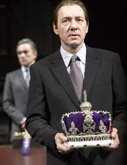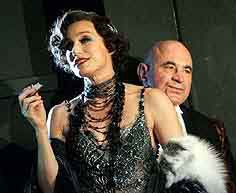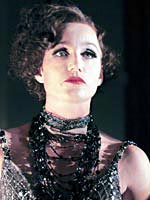You would never know it from the press hype surrounding Benedict Cumberbatch's HAMLET but there is another vacillating royal in serious trouble on the London stage and we were lucky to see it last week.
RICHARD II is the latest production in the Globe Theatre's 2015 season based around the themes of Justice and Mercy, qualities that are singularly lacking in the story of the downfall of the vain, misguided Plantagenet King who learned too late that it's more important to be human than majestic.
Charles Edwards brought his upper-class panache to the role of Richard: by turns pampered, remote, haughty and witty, he sailed through the first act on an air of privilege, uncaring of the turmoil he was creating in his wake among his lords and barons, sure in his knowledge that as an anointed King he was impervious to complaint.
However when Richard II tires of the dispute between Henry of Bolingbroke and Thomas Mowbray and banishes them both abroad he sets off a chain of events which swiftly leads to disaster. Caring little for the angry remonstrations of Bolingbroke's dying father John of Gaunt, Richard seizes his property and goods to pay for his war with the Irish and in doing so deprives Bolingbroke of his legacy. The King returns from Ireland to discover that Bolingbroke has returned from exile and rallied an army while his own followers have vanished.
Up until this point Richard has been fairly unlikeable but his realisation that his destiny is now uncertain leads him through various stages of self-pitying anger, despair, and finally to a wisdom that is touching in it's resignation. Up until the arrival back on English shores, the only moment of real poetry has been John of Gaunt's denunciation of Richard, brooding on what his reign has done to "This sceptre'd isle". William Gaunt in the small but haunting role of John of Gaunt was excellent, using up the last of his energy to rain down anger on Richard's reign.
But with Richard's growing realisation of his inadequacy, Shakespeare ups the ante and Richard finds his poetic voice, in particular when he invites his admirers "let us sit upon the ground and talk about the death of kings". Two excellent scenes follow where Richard and Bolingbroke confront each other, first at Flint Castle where Richard attempts to face down his enemy but eventually capitulates to fate and the following scene at Westminster Hall where Richard is called before the council to abdicate.
This magnificent confrontation - where vacillating Richard literally makes Bolingbroke pull the crown from his grasp and then ruminates on the transition from King to man - saw Edwards at his finest and indeed, his final scene was shot through with a noble pathos.
David Sturzaker also upped his game as Bolingbroke in his scenes with Edwards although he at times felt a bit lightweight to play such an important main role. There was very good support from William Chubb as the honest Duke of York, Richard Katz as both the murderous Exton and the Queen's head gardener and Sarah Woodward as the Duchess of York. However her major scene at the end where she begs Bolingbroke to spare the life of her traitorous son while her husband the Duke demands his son's death was played almost as slapstick and threw the tone off dramatically.
Overall, Simon Godwin's production was very enjoyable although some of the cast were a bit lightweight and the first act seemed to feature one too many scenes of the rebellious lords sweeping on to only sweep off again after a few minutes. Despite this I enjoyed it more than the Kevin Spacey/Old Vic production from 2005.
Where the production did score well was with Paul Wills set of cracked and peeling shining gold paint. As soon as I saw it I was reminded of the famous portrait of the ill-fated King in Westminster Abbey.
Showing posts with label RICHARD II. Show all posts
Showing posts with label RICHARD II. Show all posts
Saturday, August 29, 2015
Thursday, February 12, 2015
Dvd/150: THE HOLLOW CROWN: HENRY IV PARTS 1 & 2 (Richard Eyre, 2012)
The second in the BBC trilogy of Shakespeare History plays are the two parts of HENRY IV, adapted and directed by Richard Eyre with a clarity that makes them gripping viewing.
Henry IV faces an uprising led by Lord Northumberland who had helped him overthrow Richard II. Henry is envious that Northumberland's fiery son Hotspur would make a better heir to his throne than his son Hal who spends his nights roistering with the lowlifes in Eastcheap and in particular with the drunken rogue Lord John Falstaff.
Hal's killing of Hotspur at the Battle of Shrewsbury changes the King's opinion but which father figure will Hal finally acknowledge?
Fine support from Joe Armstrong as Hotspur and Julie Walters as Mistress Quickly underpin superb performances from Jeremy Irons as Henry and Tom Hiddleston as Hal.
But above all is Simon Russell Beale's quintessential Falstaff: vain, angry, lyrical, sly and finally heartbreaking.
Shelf or charity shop? Enthroned on the shelf!
Henry IV faces an uprising led by Lord Northumberland who had helped him overthrow Richard II. Henry is envious that Northumberland's fiery son Hotspur would make a better heir to his throne than his son Hal who spends his nights roistering with the lowlifes in Eastcheap and in particular with the drunken rogue Lord John Falstaff.
Hal's killing of Hotspur at the Battle of Shrewsbury changes the King's opinion but which father figure will Hal finally acknowledge?
Fine support from Joe Armstrong as Hotspur and Julie Walters as Mistress Quickly underpin superb performances from Jeremy Irons as Henry and Tom Hiddleston as Hal.
But above all is Simon Russell Beale's quintessential Falstaff: vain, angry, lyrical, sly and finally heartbreaking.
Shelf or charity shop? Enthroned on the shelf!
Sunday, September 14, 2014
Dvd/150: THE HOLLOW CROWN: RICHARD II (Rupert Goold, 2012)
This trilogy of films based on four Shakespeare history plays, commissioned by the BBC for the 2012 Cultural Olympiad, are excellent examples of intelligent, gripping stage-to-screen adaptations.
All three are cast to perfection: Ben Whishaw is marvellous as Richard, fey, capricious and remote, who, like Lear, initiates his own downfall by banishing his cousin Bolingbroke to six years abroad then appropriates his cousin's fortune and lands when Bolingbroke's father John of Gaunt dies.
Rory Kinnear is fine as the conflicted usurper Bolingbroke, their scenes together have an electric quality especially in the riveting abdication scene.
Excellent support comes from Patrick Stewart as John of Gaunt as well as David Suchet, Lindsay Duncan and David Morrissey among others.
Goold, whose adaptation with Ben Power has a fast-paced clarity, directs in a fluid style which leaves no symbolism unchecked and has a slight over-reliance on slow-motion detailing.
Shelf or charity shop? I'faith my lord, shelf.
Rory Kinnear is fine as the conflicted usurper Bolingbroke, their scenes together have an electric quality especially in the riveting abdication scene.
Excellent support comes from Patrick Stewart as John of Gaunt as well as David Suchet, Lindsay Duncan and David Morrissey among others.
Goold, whose adaptation with Ben Power has a fast-paced clarity, directs in a fluid style which leaves no symbolism unchecked and has a slight over-reliance on slow-motion detailing.
Shelf or charity shop? I'faith my lord, shelf.
Friday, November 25, 2005
RICHARD II / AS YOU DESIRE ME
It sounds like the start of an odd love letter but it in fact heralds the fact that I have done two theatre trips with Mr. Guy Thomas in the past week.
 Last Thursday was RICHARD II at the Old Vic which finally saw Kevin Spacey delivering a performance worthy of that stage's history. Although not one of the most poetic of Kings - and I think some of the speechs could have done with more introspection and less tart snittiness - he really excelled in the deposition scene where his cry of anguished frustration "I have no name" was all the more powerful for seemingly coming from nowhere. He was ably supported by Ben Mles whose Bolingbroke slide smoothly into power after his exercise in regime change in a strangely Blairite manner. There was excellent support from Julian Glover as John of Gaunt as well as Oliver Cotton and Peter Eyre.
Last Thursday was RICHARD II at the Old Vic which finally saw Kevin Spacey delivering a performance worthy of that stage's history. Although not one of the most poetic of Kings - and I think some of the speechs could have done with more introspection and less tart snittiness - he really excelled in the deposition scene where his cry of anguished frustration "I have no name" was all the more powerful for seemingly coming from nowhere. He was ably supported by Ben Mles whose Bolingbroke slide smoothly into power after his exercise in regime change in a strangely Blairite manner. There was excellent support from Julian Glover as John of Gaunt as well as Oliver Cotton and Peter Eyre.
Tonight we saw Pirandello's AS YOU DESIRE ME at the Playhouse Theatre with Kristin Scott Thomas and Bob Hoskins, slickly directed by Jonathan Kent. I had seen the film starring Greta Garbo yonks ago so knew the story - Elma is an amnesiac singer in a Berlin cabaret, one night she is followed by a man who tells her that she is in fact Lucia, the wife of an Italian count who had disappeared from their villa in WWI when she was raped and kidnapped by some German soldiers. Bored by her decadent life as a mistress to a violent writer she goes to Italy where she is greeted by the count, her aunt and uncle.

Four months later she agrees to meet her sister who had regretfully allowed the missing woman's death certificate to be signed. However what was at the heart of that decision was who gained control of the villa, as it was part of the wife's dowry on her death it reverted to her sister. Is Lucia really Lucia or is she simply being used as a pawn? When her ex-lover Santer arrives at the villa with an insane woman who can only speak the name of the aunt the whole question of identity is blown apart.
 Sadly it reads and lives in the mind better than it does on stage - at 90 minutes it still seemed padded and repetitive. However it was worth seeing for the livewire performance of Scott Thomas - almost bursting out of her slinky 30s dresses with frustration of not knowing who she is. Hoskins was strangely muted as Santer but there were memorable performances by Margaret Tyzack and John Carlisle as the woman's older relatives.
Sadly it reads and lives in the mind better than it does on stage - at 90 minutes it still seemed padded and repetitive. However it was worth seeing for the livewire performance of Scott Thomas - almost bursting out of her slinky 30s dresses with frustration of not knowing who she is. Hoskins was strangely muted as Santer but there were memorable performances by Margaret Tyzack and John Carlisle as the woman's older relatives.
 Last Thursday was RICHARD II at the Old Vic which finally saw Kevin Spacey delivering a performance worthy of that stage's history. Although not one of the most poetic of Kings - and I think some of the speechs could have done with more introspection and less tart snittiness - he really excelled in the deposition scene where his cry of anguished frustration "I have no name" was all the more powerful for seemingly coming from nowhere. He was ably supported by Ben Mles whose Bolingbroke slide smoothly into power after his exercise in regime change in a strangely Blairite manner. There was excellent support from Julian Glover as John of Gaunt as well as Oliver Cotton and Peter Eyre.
Last Thursday was RICHARD II at the Old Vic which finally saw Kevin Spacey delivering a performance worthy of that stage's history. Although not one of the most poetic of Kings - and I think some of the speechs could have done with more introspection and less tart snittiness - he really excelled in the deposition scene where his cry of anguished frustration "I have no name" was all the more powerful for seemingly coming from nowhere. He was ably supported by Ben Mles whose Bolingbroke slide smoothly into power after his exercise in regime change in a strangely Blairite manner. There was excellent support from Julian Glover as John of Gaunt as well as Oliver Cotton and Peter Eyre.Tonight we saw Pirandello's AS YOU DESIRE ME at the Playhouse Theatre with Kristin Scott Thomas and Bob Hoskins, slickly directed by Jonathan Kent. I had seen the film starring Greta Garbo yonks ago so knew the story - Elma is an amnesiac singer in a Berlin cabaret, one night she is followed by a man who tells her that she is in fact Lucia, the wife of an Italian count who had disappeared from their villa in WWI when she was raped and kidnapped by some German soldiers. Bored by her decadent life as a mistress to a violent writer she goes to Italy where she is greeted by the count, her aunt and uncle.

Four months later she agrees to meet her sister who had regretfully allowed the missing woman's death certificate to be signed. However what was at the heart of that decision was who gained control of the villa, as it was part of the wife's dowry on her death it reverted to her sister. Is Lucia really Lucia or is she simply being used as a pawn? When her ex-lover Santer arrives at the villa with an insane woman who can only speak the name of the aunt the whole question of identity is blown apart.
 Sadly it reads and lives in the mind better than it does on stage - at 90 minutes it still seemed padded and repetitive. However it was worth seeing for the livewire performance of Scott Thomas - almost bursting out of her slinky 30s dresses with frustration of not knowing who she is. Hoskins was strangely muted as Santer but there were memorable performances by Margaret Tyzack and John Carlisle as the woman's older relatives.
Sadly it reads and lives in the mind better than it does on stage - at 90 minutes it still seemed padded and repetitive. However it was worth seeing for the livewire performance of Scott Thomas - almost bursting out of her slinky 30s dresses with frustration of not knowing who she is. Hoskins was strangely muted as Santer but there were memorable performances by Margaret Tyzack and John Carlisle as the woman's older relatives.
Subscribe to:
Posts (Atom)














